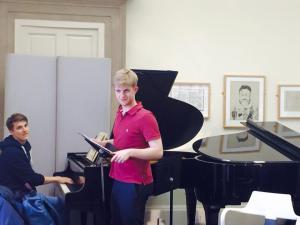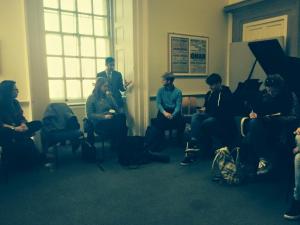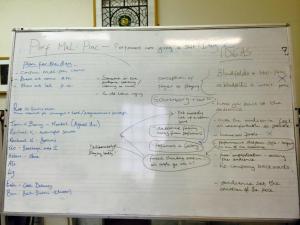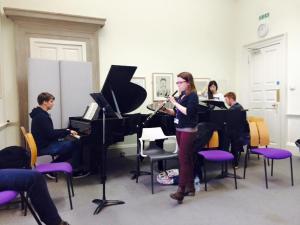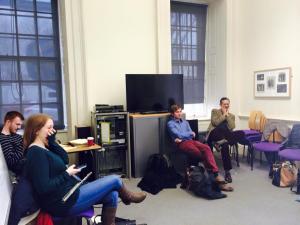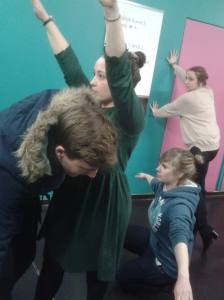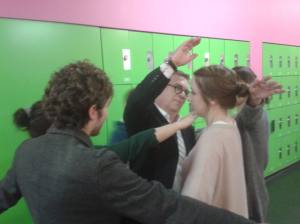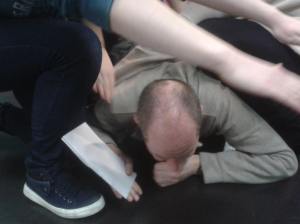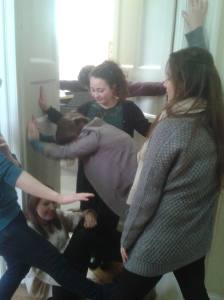This year, the Colab festival at Trinity Laban has exceeded all my expectations. The creativity, skill, open- mindedness, cooperation and dare I say.. collaboration of all the people involved has been incredible! I was working on the Performance mal- practice project with a group of about ten musicians and our wonderful mentor, Karl Lutchmayer. Here is my account of the week: I was working on the Performance mal- practice project with a group of about ten musicians and our wonderful mentor, Karl Lutchmayer. Here is my account of the week:
Day 1 The group was mostly present at out start time of 10am… looking fairly sleepy and somewhat irritated at having to be in College. Not having much idea of what we were in for, we looked towards our mentor (characteristically dressed in a combination of velvet and corduroy) for support. The group was mostly present at out start time of 10am… looking fairly sleepy and somewhat irritated at having to be in College. Not having much idea of what we were in for, we looked towards our mentor (characteristically dressed in a combination of velvet and corduroy) for support. After welcoming us to the project, Karl played us a recording of Glenn Gould’s rendition of a Mozart Sonata. This demonstrated several components of what we might call ‘performance mal-practice’ . This sparked a debate about what the elements of mal-practice are and how we could utilise or alter them, in order to create something which pushes boundaries of traditional/ ‘acceptable’ performance practice, while retaining its coherency. Here is what we came up with: Here is what we came up with: 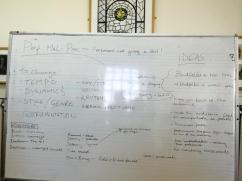
We also threw around some ideas of what we could do in our concert in St. Alfege’s Church on Thursday. Everyone contributed to the discussions really well and suggested repertoire which they could play. We had a combination of Beethoven, Debussy, Handel, Brahms and Mozart suggested from our various different instrumentalists in the group. In the afternoon, we separated out into the breakout rooms in order to try some of our mal-practice ideas out on the repertoire we had suggested! This process demonstrated how difficult it is to break out your shell when it comes to performance- especially when we have trained for so many years to play or sing in a certain ‘acceptable’ and ‘tasteful’ way!
Day 2
Despite a slightly late start, we were very organised on day 2. We decided on a plan for the day, which I’m proud to say, we pretty much stuck to! Here is our plan:
We also managed to narrow down and refine the repertoire which we would be working on for the concert, as well as ruling out some of the less feasible ideas which we had thought of on Monday! For example, we thought it would be rather interesting to blindfold our audience in one half of the concert- to see how much of an impact the visual perception of a performance has, compared to the aural one. However, we eventually decided against this idea because most of the audience on Thursday will be of the older generation.. they might not feel very comfortable be blindfolded.. We once again went off into our breakout rooms to practise our mal-practice for the ‘show and tell’ session in the afternoon in which Karl would be present to give us a little guidance if we needed it. The afternoon session did prove to be very interesting indeed! A highlight for me was the idea that a Mozart oboe Concerto could be played in two keys at once- with the oboe playing in the original key of D major and the piano playing in C major! The effect was extraordinarily like Prokofiev (once you had listened a few times) This idea is clearly one of mal-practice, however the music remains coherent!
Day 3
As well as refining the details of our concert programme for Thursday, Karl suggested that it might be a good idea if we all had a go at playing a piece which we were familiar with, ‘tastelessly’. After trying this on Day 2, I knew how surprisingly difficult this was to do.. and I’m not sure my group fully believed me. However, when each of them tried playing for themselves, the agreed- it is very hard! This exercise led onto a brainstorming about what makes a performance ‘tasteless’? We felt that it was different according to the instrument and of course the style of the music that you are playing. The factors which we found to be most influential on how vulgar we could make something sound were; vibrato, rubato, tuning and speed and most importantly, the extent to which you commit to what you are doing. In order to demonstrate what could be called ‘tasteless’, we found and listened to several examples on youtube.
https://www.youtube.com/watch?v=I4coyGh1MIU 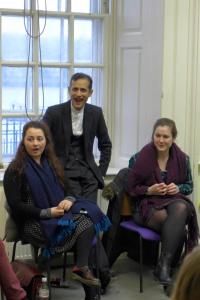
Day 4- CONCERT DAY
Programme:
Liszting A rendition of Liszt’s Campanella played at about 1/16th speed played by Karl Lutchmayer, with a special guest appearance..
A Mozart Concerto in C (and D) This is fairly self explanatory… (in Pyjamas)
Clair de lunelight Sonata A Debussy-esque version of the second movement of Beethoven’s Moonlight Sonata- accompanied by alto flute (and mobile phone..)
Chaconne: Bach to the future A kitch transcription of a transcription… Bach-Busoni Chaconne gets a romantic make- over in the style of Chopin
Beethoven trio no.1: A ‘standard’ interpretation A flute, Cello and Piano trio playing in an ensemble as soloists…
Intermezzo no.2 op118: Breaking Brahms A very lazy performance of a very beautiful Brahms Intermezzo…… http://www.bbc.co.uk/news/science-environment-23717228 (This demonstrates the effect of ‘Breaking Brahms’.)
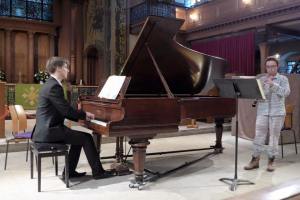
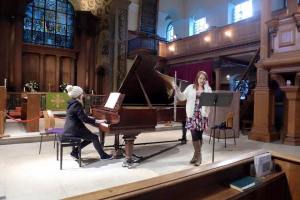
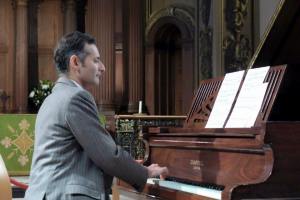 After the concert, we had a well deserved drink at the Pub and a chat about the various reactions of the members of St Alfege’s audience. As predicted, most of the crowd were fairly well aged… and although some enjoyed and understood our concept, it was clear that several missed the point completely! This was especially obvious in the concert series’ organiser’s case- when I had finished explaining my very ‘bored’ appearance when playing the Brahms she asked, bemused, ‘but why were you bored?’ She obviously didn’t listen to Karl’s lengthy explanation of our project and what we had been working on during the week…..
After the concert, we had a well deserved drink at the Pub and a chat about the various reactions of the members of St Alfege’s audience. As predicted, most of the crowd were fairly well aged… and although some enjoyed and understood our concept, it was clear that several missed the point completely! This was especially obvious in the concert series’ organiser’s case- when I had finished explaining my very ‘bored’ appearance when playing the Brahms she asked, bemused, ‘but why were you bored?’ She obviously didn’t listen to Karl’s lengthy explanation of our project and what we had been working on during the week…..
Day 5
As we had fulfilled the task of a performance with mal-practice, we thought we could take it a step further… At the beginning of every academic year, the first year undergraduate students from Laban are asked to do an exercise in losing inhibitions. This involves moving as a group through the music faculty, striking poses in order to block corridors, staircases, entrances to lifts etc. so that the musicians who are trying to move from place to place, are interrupted, confused and often very irritated. The aim for the dancers is to take no notice of the reactions of the musicians and continue their exercise. So, we, my colab group, thought it would be interesting for us to explore this concept of performance mal-practice and what could be called social mal-practice, by doing this exercise ourselves in the Laban building at the celebrations for the end of the first week of colab! This turned out to be brilliant fun and quite hard work as we committed fully to the task at hand. The most hilarious moment was when we trapped the Principal of Trinity Laban in a corridor as he tried to leave the Laban building with his family!

